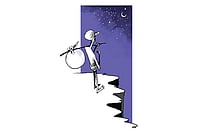Information, as they keep telling us on television screens and in newspapers and journals like this one, is the key. This key apparently unlocks anything from a bright individual future to a just and democratic society, so the more we have of it, the better off we are. And if this is true, then it is just as well, because certainly we have more access to more information than ever before.
The idea that "more is always better" is not just a staple of the utilitarian philosophy that underlies mainstream economic analysis. It has become a basic principle governing modern life, determining the predisposition of consumers as much as an axiom of interpersonal behaviour. Insightful analysts have been pointing out for some time, however, that the surfeit of any good can ultimately cause not just embarrassment but even discomfort, and that excessive consumption in general is not just unsustainable but even socially harmful.
In the case of information, unlike so much other consumption, at first "more" appears to be unambiguously "better". After all, surely it is always better to have more access to facts about everything. In a world in which we are constantly called upon to make choices, information is not only desirable but indeed crucial to help us make these choices. And information plays a very positive role also in shaping public responses to undesirable processes and events as well, and so can help in their future prevention.
But the matter is not so simple. It turns out that the superfluity of information also has its drawbacks, as much or possibly even more than other forms of consumption. There are at least three levels at which this can become a problem. Too much information can leave you with neither the time nor the ability to decide what is significant and even cause you to ignore some important data. Then there is the sheer boredom and/or irritation which an overwhelming onslaught of facts can generate, and which all of us experience ever more frequently. And of course there is a more sinister reflection, that perhaps the process is less innocent and generous than we imagine; that even as information of a huge range becomes more widely available and even forced upon us, actual knowledge is becoming more concentrated, the monopoly property of a few.
Think first, of the sheer quantity of information to which we are now routinely exposed. The process begins early, in primary school: no one is more severely subjected to a barrage of facts and data than our schoolchildren. And what is worse, they - unlike those of us who are fortunate enough to have grown too old for it - have to remember all this information, and be tested on it. Primary schoolchildren now have to memorise not only all the multiplication tables up to 20, but also such important facts as the dates when various government departments were established.
Most literate adults do not have to remember quite as many facts as their children do, but nevertheless the barrage of information can be quite daunting. Even something as straightforward as watching a cricket match on television can become a foray into the brave new world of infinitesimally detailed statistical trivia: we are informed, for example, that it is the 14th time in this innings that a particular batsman has directed the ball towards silly mid-on compared to 11 times towards mid-wicket.
Of course, the Internet takes the entire issue onto a whole new plane, or rather new cyberspace. Here the possibilities and the access to information are, virtually, endless, and the enthusiastic fact-grubber can spend a lifetime adding to a store of data that will in all likelihood never be used because all of his or her time will be spent on the acquisition of ever more information. Even those who are less enthusiastic cannot escape the overload if they are "connected" - e-mails from eager networkers ensure that more and more facts keep jamming the lines.
The real question, of course, is not "where will it all end?" (answer - it wont) but "what does it all mean?" And it is when this is considered that an uneasy suspicion begins to dawn. Perhaps all this information can actually have the perverse effect of reducing access to knowledge. This is not only because too many facts deaden the mind, or at the very minimum benumb us and prevent us from asking any more questions for fear of being confronted with even more facts. It is also because, finally, real knowledge (always in history the basis of social control) is now seen as private property, which can be bought and sold, but more importantly can be held as the monopoly of a few.
The entirely peculiar concept of intellectual property rights, which actually emphasises this, runs counter to the way in which knowledge has evolved and developed over time in all societies. But it is gradually becoming more widely accepted by many, not least because of the sheer force and extent of all the bits of information which stress it as normal, natural and necessary. So some types of information overload have actually contributed to making knowledge more privately controlled and less accessible.
The problem, of course, is not in information itself, but in its excessive and undiscriminating proliferation. But its potential for furthering democracy, as well as its ability to bring together and mobilise people for important social causes, are undeniable. For that net effect to be positive, it requires much more work from all of us who are at the receiving end, to sort out the few grains of gold from all the mountains of sand.
(
The writer teaches economics at Jawaharlal Nehru University
and is the author of several books
.)























